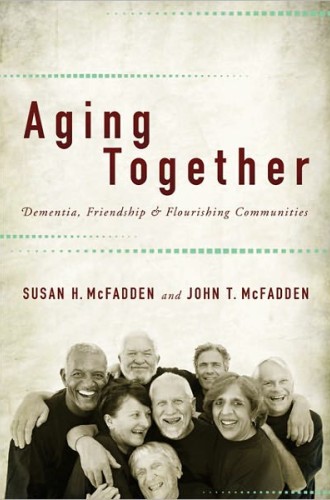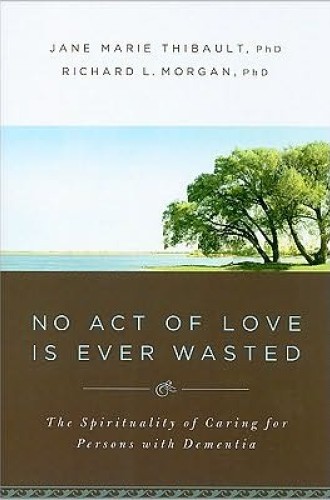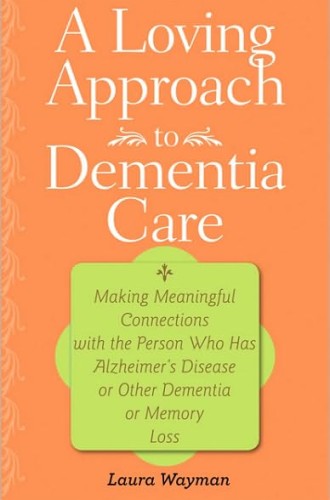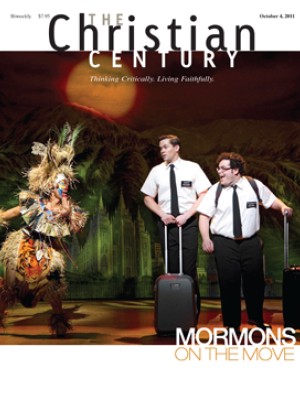Caregivers’ calling

My father was diagnosed with Alzheimer's disease at the age of 80. Shortly after he received the diagnosis, I sat with him at the kitchen table. With a look of despair on his face, he said, "I don't know how I've let this happen to me." I tried to assure him that this wasn't something he had "let happen." To both of us, however, the diagnosis felt like a death sentence.
Had I read the three books listed here, especially Susan and John McFadden's Aging Together and its chapter "Receiving the Diagnosis," I might have been more helpful to my father in that difficult moment. I might also have had a more coherent response to the well-intentioned friends of my mother who told her, as my father's illness grew worse, that she should "simply forget him, let him go and act as if he were already gone." He needed precisely the opposite assurance—that he would continue to be loved and valued, and that he would have our support in living his life as well as possible amid adversity.
Read our latest issue or browse back issues.
The McFaddens acknowledge that the announcement of a diagnosis of cognitive impairment or Alzheimer's can be devastating to hear. But they also imagine and argue that it can be otherwise:
If we understand the diagnosis of cognitive impairment as a kind of death sentence, delaying the diagnosis as long as possible makes strategic sense. . . . But if instead we view living with some degree of cognitive impairment as a next step in life's journey, one that does not preclude the possibility of living in a way that continues to be rich and fulfilling, then seeking diagnosis sooner can be helpful and positive.
As the North American population grows older and lives longer, more and more people will be hearing the diagnosis my father heard or will suffer some form of cognitive impairment from a cause other than Alzheimer's. According to Jane Thibault and Richard Morgan in No Act of Love Is Ever Wasted, "nearly 50 percent of the population will develop a dementing disorder by age eighty-five . . . and by 2050, as many as sixteen million Americans will have some form of dementia, with Alzheimer's being the most prevalent." There's another implication to all this, note Thibault and Morgan: "If you haven't yet been a caregiver, you likely will be one."
All three books address the manifold challenges facing individuals and families, religious congregations and society, from the growing incidence of cognitive impairment, whether caused by Alzheimer's, Parkinson's, stroke or other less well-known possibilities. But authors, teachers and others who hope to influence our thinking face a challenge: most of us are so terrified of these disorders that we avoid facing them, much less learning about them, and are inclined, as were my mother's friends, to withdraw from those who suffer from them.
I was reading one of these books while on vacation with a group of friends. Spotting the word dementia in the title elicited an adverse reaction. "Dementia—why would you want to be reading about that?" Never mind that everyone in that group was somewhere between the late fifties and early seventies in age, which makes the topic relevant. The dread is at red-alert level, notes Margaret Morganroth Gullette in a recent New York Times op-ed column, "Our Irrational Fear of Forgetting." "Greater public awareness of Alzheimer's, far from reducing the ignorance and stigma around the disease, has increased it. People over 55 dread getting Alzheimer's more than any other disease, according to a 2010 survey by the MetLife Foundation." Gullette sees a fear that makes even absent-mindedness "a clinical symptom" in our "hypercognitive society."
The authors of these books hope to lessen the dread, fear and stigma surrounding dementia by providing both information and stories, by reframing the ways that we think about cognitive disorders and those who suffer them, and by offering practical advice for caregivers and community.
Aging Together is the most prophetic and theological of the three. The McFaddens bring together their experience in the fields of gerontology and ministry in order to argue that "dementing illnesses" should be viewed as disability. Just as society and churches have taken steps to include people with other disabilities, so we need to include those suffering from dementia as well as those who care for them. The McFaddens note that even though half of people 85 and older suffer cognitive impairment in varying degrees, the prevailing norms for "healthy aging" do not allow any place for cognitive impairment. Measured against the standard images and norms for healthy aging, those who suffer dementia are abnormal, even failures. That was what my father felt when he received his diagnosis.
The McFaddens argue that the plight of those suffering dementia may say more about the fears, values and norms of our society than about the illnesses and those who suffer them.
Rather than understanding dementia as an experience shared by the entire community, whose role and responsibility is to accompany a valued member on this journey, it is treated as a private tragedy to be dealt with by the individual, his or her family, medical professionals, and professional caregivers.
While acknowledging the role of medical and professional care, the authors argue that a key determinative factor in the sufferer's well-being is social context—the community. The pervasive tendency to medicalize aging and to define it as a problem to be solved by medical interventions reflects the limits of our communities and our fears. This is not the case in all cultures. A Taiwanese medical student noted that she did not realize her grandfather had Alzheimer's until she began attending school in the United States. "He changed as he got older, but to us, he was still just Grandfather."
Aging Together offers a prophetic perspective by challenging our socially constructed versions of reality and our tendency to look for medical miracles and cures. Instead we should work to create communities that are hospitable to the cognitively impaired.
Drawing on the work of theologians Stanley Hauerwas and Tom Reynolds, the McFaddens also see the church as a place that trains Christians in "subversive friendship": "Congregations are called to be schools for subversive friendship, subversive because they do not follow the script of the prevailing culture, which argues that there should always be a practical return for friendship."
A "practical return" for care and love is a theme of Thibault and Morgan's No Act of Love Is Ever Wasted. Thibault, a professor of gerontology, and Morgan, a chaplain, address the challenge of caregiving. Caregivers and others who support those with dementing illness may feel that their efforts, often made out of love and as a ministry of service, are not reciprocated or acknowledged; they may even feel that their time and energy are wasted.
Dementia is probably one of the most spiritually and theologically challenging of all illnesses because it calls into question the nature of personhood. It causes us to ask such questions as: "Who am I when I can't name things and don't know what they are? Who am I when I can't think, can't love, and can't even respond to love? Who am I when I don't know who I am?"
The authors respond by calling both caregiving and care receiving part of our spiritual path. They acknowledge the depth and terror of these challenges but maintain that dementia sufferers continue to have a spiritual life and are capable of both spiritual growth and ministry to the spiritual growth of others.
For this to happen, however, caregivers and others relating to those suffering dementing illness must be willing to enter into the experience of the impaired, listening for their cues and clues. "We [caregivers] need to enter their world" instead of trying to force our reality upon those who suffer dementia. Often the default response of family members, visitors and some caregivers is a "reality orientation"; they pepper the impaired with questions like, "Do you know who I am? What day is it? What did you have for breakfast?" The result of such an approach is usually increased anxiety, agitation and isolation.
Thibault and Morgan describe the relationship of caregiving and care receiving as a mutual spiritual path made visible by the caregiver's self-giving love. While one might argue that self-giving love is at the heart of Christian faith and discipleship, that doesn't mean it's easy or that it comes naturally, or even that we're very good at it. Can we enter into the world of the cognitively impaired in love when there is little practical return and little social validation for doing so? This is a test of our faith.
No Act includes a helpful chapter on planning and leading worship for those who suffer from dementia. Simply doing a shortened rerun of the Sunday morning service or sermon is not meaningful or effective. Thibault and Morgan offer suggestions that can adapt a congregation's regular worship, making it more inclusive for the cognitively impaired and differently abled.
I disagree with Thibault and Morgan at one point: they criticize churches and clergy for failing to offer effective ministry to dementia sufferers and challenge seminaries to add courses on aging and dementia. It's too easy, in my view, to "fix" problems by incorporating a new study into already stretched and fragmented seminary curricula. More realistic would be an effort to teach congregational members about dementia and train and equip them to relate to those among us who are cognitively impaired.
In A Loving Approach to Dementia Care, gerontologist Laura Wayman concentrates on practical advice for caregivers. Chapters include case studies that cover most of the challenges facing family and caregivers, from delusions and paranoia on the part of the cognitively impaired to how to persuade them to accept help or even to bathe.
Wayman says, for example, "You will never win an argument with someone who has dementia." She advocates the "affirmative response" method so that caretakers learn to affirm the emotions and experience of the impaired person even when his or her behavior is challenging. Only then can one begin to redirect the impaired person. As in parenting, the goal is to avoid power struggles. Wayman insists that all behaviors are forms of communication. She started a training program called the Dementia Whisperers; the idea is to listen, soothe and make progress without confrontation.
Wayman stresses that the cognitively impaired primarily relate emotionally rather than cognitively. They "read" the emotions and body language of a family member, visitor or caregiver. This means that those who function extremely well in a hypercognitive and rational mode may find themselves "impaired" and thus ineffective when they enter the more emotive world of the cognitively impaired. "The person who has dementia," writes Wayman, "will feel what you are feeling and reflect those emotions back."
"In the caregiving process," she insists, "you [the caregiver] are the most important person, and if you do not take care of yourself, you will not be able to provide care for your loved one or client." She teaches caregivers how to manage themselves, their stress and, in some cases, their guilt.
All of the authors emphasize that although caregiving will often seem without reward, there are nonetheless moments, often unexpected, when the ill become the spiritual guides and mentors of the caregivers. In the final two years of his illness my father was in a care facility. On one of our last visits my wife and I walked arm-in-arm with my father to an enclosed, outside garden. By this time it was difficult to make out anything he said. But on that day, as we moved slowly toward the garden, he stopped. Looking up at me, he said clearly, "You are a good man."
"Did you hear that?" asked my wife. "Yes," I answered. "No," she persisted, "did you really hear? That's what you've been waiting so long to hear, isn't it? Your father just gave you his blessing." She was right. Several weeks later he died. I was blessed by his words to me that day—and by the many times during those last years when we sat together quietly on a bench in that garden. Such moments of companionship had eluded us during other times of our lives, but in those last years they were a gift of his illness.








